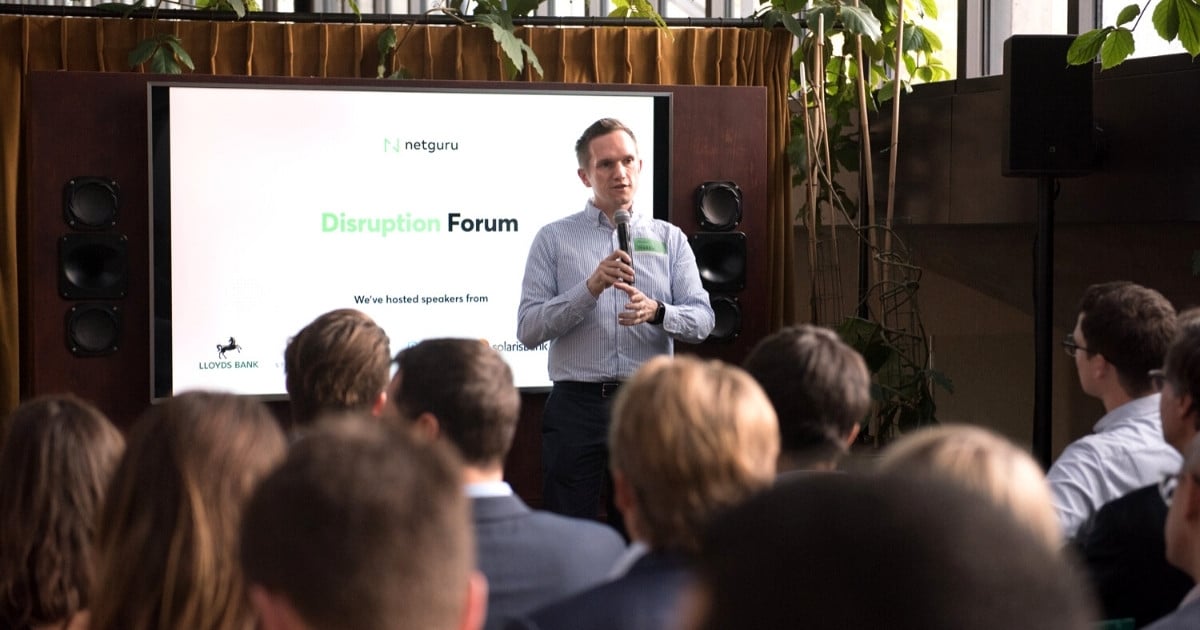Learn From the Leaders How to Use Innovation to Grow Your Business - Key Takeaways from Disruption Forum Innovation Labs

On October 22, Netguru hosted Disruption Forum Innovation Labs, which brought together leading innovation experts from companies in industries including finance, retail, healthcare, and automotive to share their insights and experience. Across nine sessions, 19 speakers from companies like Mastercard, Cartier, Citi Ventures, Deutsche Bank, Roche, Sanofi, and HSBC covered topics like:
- How to incubate ideas fast and drive projects with multiple stakeholders
- Turning problems into prototypes
- How to break down silos
- Sourcing startups for collaboration and corporate innovation
- Winning strategies for innovation in banking
More than 800 attendees signed up for the event, and over 4k people watched chosen sessions live on our social media. In one day, we traveled around the world to join speakers in Singapore, New York, Paris, London, Zurich, Berlin, and more, packing in helpful information and actionable advice with every stop.
If you couldn’t attend Disruption Forum Innovation Labs live, there’s still time to sign up for on-demand access to event recordings.
Here’s a taste of the event.
Harnessing internal innovation
In ‘Mastercard's Lesson: Between Banks and Fintechs’ Rohit Kumar, Director of Products and Innovation at Mastercard, talked us through how the company approaches innovation. “Consumer behavior is changing every second,” he said. “That’s why we have to do continuous innovation.”
Rohit revealed that Mastercard has various internal programs to promote innovation within the business.
“We have internal hackathons where we ask employees to come together and have a two-day session in a room,” he said. “We ask them to think about a business problem and then provide a solution in two days' time with a prototype or POC. Also, we have an idea box where we ask our employees to submit any new ideas internally so we can bring them to life.”
His advice to companies trying to set up their own innovation lab or unit is to focus on people.
“Think about how you can bring in the right people – that diversity, different mindsets – and also how you can bring people, processes, and technology together,” he said.
Looking outside of the organization
Netguru’s Client Partner Moritz Spangenberg was joined by three corporate innovation experts in ‘How to Source Startups for Corporate Innovation – Lessons from Leaders.’ During the session, the panel discussed how to get the best out of external innovation, including sourcing and selecting startups, investing in them, and incubating them – known as corporate venture capital (CVC).
“I think every large enterprise should ask themselves whether they’ve got the internal mechanisms within the organization to drive innovation or whether they should collaborate with externals,” said Warwick Hill, Investor and Corporate Advisor at Supercapital Partners.
He observed that successful companies have a program where they not only disrupt themselves, but they start to look at how they do business and see whether they can adopt an outside-in approach.
“Startups have the advantage over corporates in that they usually know the pain points of customers very well and are very fast to adapt to this,” said Maximilian Schausberger, Managing Director at Elevator Ventures (CVC of Raiffeisen Bank International).
He also pointed out that certain segments of customers may be better served by the low-cost digital structures common in startups versus incumbents.
Creating better prototypes
In ‘Turning Problems Into Prototypes,’ the panel talked about the importance of prototyping, their experiences with running design sprints to validate ideas, and how to run them successfully.
“Invalidation is a positive outcome,” said Peter Collingridge, EMEA Head, D10x at Citi Ventures. “Validation is great, but invalidation is also great because it saves a lot of time and money spent building the wrong thing that nobody wants,” he said.
Veronika Bridgman, Co-founder of Sprint Kingdom, stressed the importance of data in building better prototypes.
“Data is sacred, especially audience data,” she said. “You need to have it. You need to have your customers, or potential users, or potential audience as part of your sprints, and you need to find a way to get it – it doesn't matter if you have any budget or no budget.”
Embracing failure
In an industry focused session, experts from HSBC, Deutsche Bank Innovation Labs, and Rabobank came together in ‘Banking Innovation.’
The panel discussed designing organizational structures for innovation, the role of communication, and winning strategies for innovation in banking. A key message from the session, and one that’s applicable to every industry, was the importance of getting comfortable with failure.
Steve Suarez, Global Head of Innovation, Finance & Risk at HSBC, explained that a shift in mind-set is required to be successful. “When managing risk you want to eliminate failure. When innovating you actually want to promote failure – you want to learn fast and learn from your failures. If you're not failing enough, you're actually not being innovative,” he said."
Nataly Nieves Reyes, Innovation Specialist at Deutsche Bank Innovation Labs, agreed. “In reality, for everyone that works in innovation, failure is just part of your day job,” she said.
She explained that Deutsche Bank adopts a phased approach to initiatives.
“We start small before we scale, so if phase one fails, we may change the strategy or the way we do things before the next level,” she said. “As long as you learn something from those failures, it’s something really well-embraced, accepted, and normal within an innovation function.”
If you missed Disruption Forum Innovation Labs or would like to re-watch any of the sessions, sign up here for the full set of recordings.







